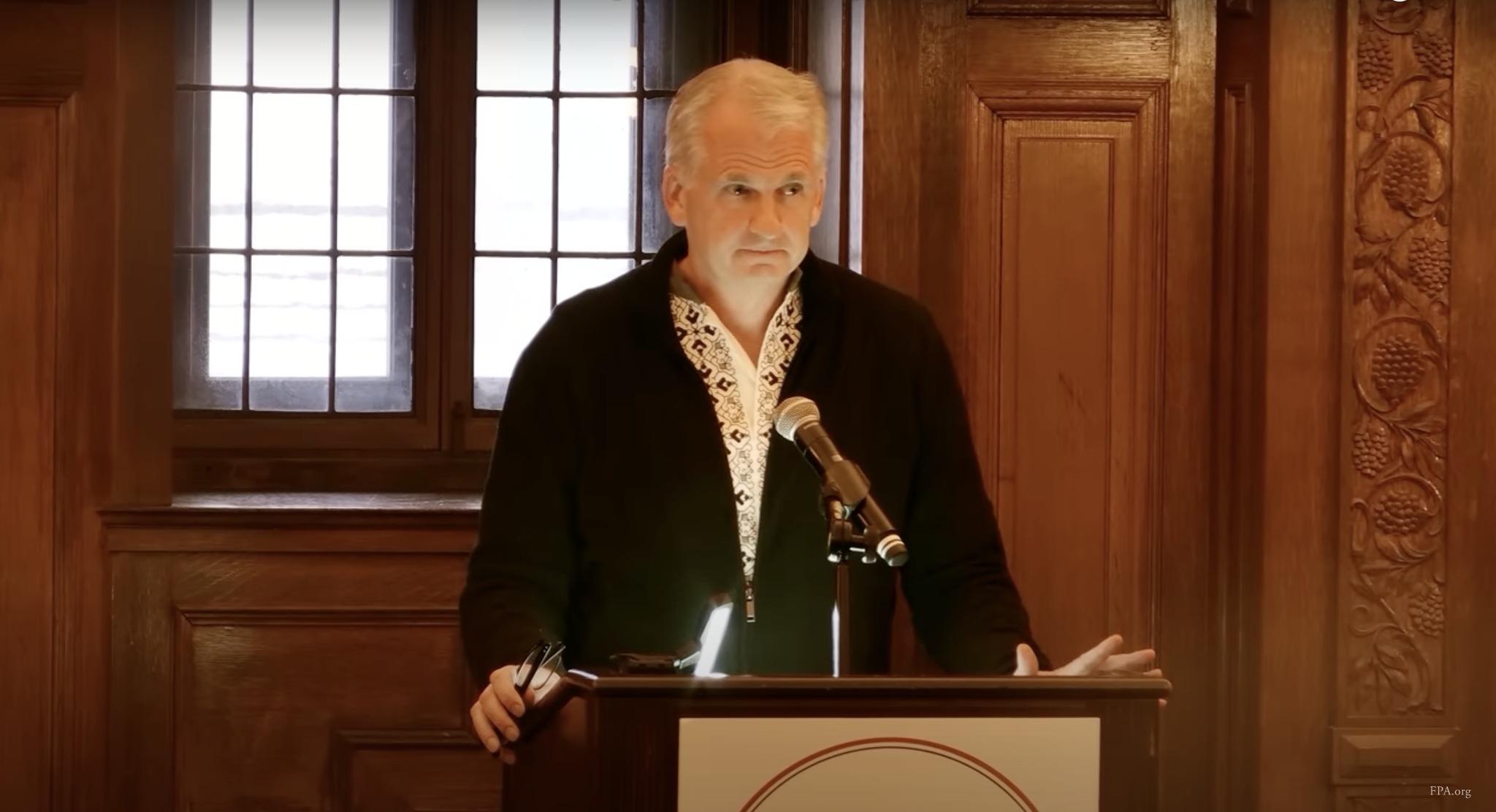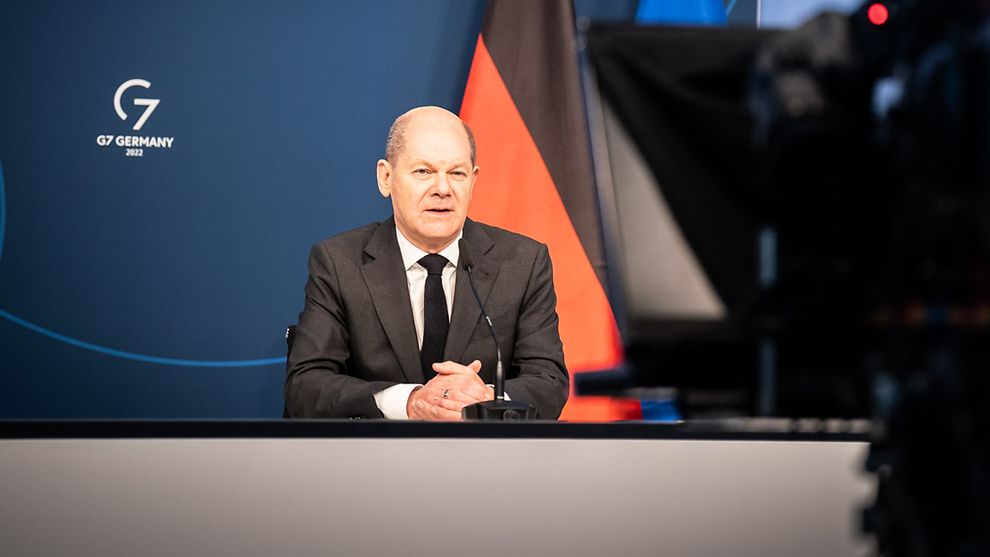At Foreign Policy Association's annual W. Michael Reisman Distinguished Lecture on International Law and Diplomacy in New York City on 18 April, American historian Timothy Snyder slammed the US for its six-month delay in approving drastically needed military funding for Ukraine in Congress. Shortly after the lecture, Congress finally passed the $61 bn bill. The delay, however, left the Ukrainians outgunned 8:1, leading to the fall of the city of Avdiivka and enabling current Russian creeping gains.
In his lecture, titled The Peril of Slowness: American Mistakes during Russia's War of Aggression in Ukraine, Snyder argues that American foreign policy failed Ukraine because it tends to distance itself from reality and avoid thinking about ways to win the war against Russia, which threatens not only Ukraine but also the global order and freedom.
Snyder identifies two factors that influence the perception of time and lead to shortcomings in policymaking:
- The internet creates a "perpetual groundhog day" mentality, forcing people to constantly reaffirm their beliefs and hindering progress.
- History is reduced to simple analogies through sayings like "history repeats itself," which breeds a sense of inevitability and impotence to change the situation.
Europe helps more than US as per GDP
Despite this slowness in supporting Ukraine, Americans maintain the view that they are doing everything possible and that others should be grateful to them, Snyder claims. However, when measuring the percentage of GDP spent on supporting Ukraine, the US lags behind countries like Czechia, Slovakia, Bulgaria, Cyprus, Malta, and numerous other European countries.
"And we're not even vaguely competitive with the Norwegians, Estonians, Lithuanians, Latvians, or Poles," Snyder says.
Estonia and Denmark contributed the highest percentages of their GDP to support Ukraine between 24 January 2022 and 15 January 2024, donating 3.6% and 2.4%, respectively.
In terms of total amounts, the EU institutions, such as the European Commission and Council, pledged the most bilateral aid at nearly €85 ($92) billion as of 15 January 2024. The United States was the second-largest donor, committing €24 ($26) billion, according to the Statista research department.
Why Americans should not take Ukrainian resistance for granted
Snyder calls on American leaders to think in terms of "conjunctures"—moments of great possibility where events can branch off in radically different directions based on the choices made.
At the outset of the war in February 2022, both the American foreign policy establishment and the Kremlin believed that Ukraine would swiftly fall within 72 hours. However, reality unfolded along a different timeline, one in which Ukraine mounted a stubborn resistance, Zelenskyy and his government remained in the country, and Russia failed to seize control of all Ukraine's resources.
Snyder emphasizes that as Americans find themselves on this more favorable timeline, they begin to take it for granted, forgetting how easily things could have played out differently. He warns that American inaction is creating the conditions for a potential collapse of the Ukrainian front and further Russian advance if Ukrainian allies delay and slow down the military aid.
The delays in delivering aid have already allowed Russia to start a major offensive in Kharkiv Oblast in May and continue razing Ukrainian cities to the ground through daily shellings.
Why Americans "owe to the Ukrainians"
Timothy Snyder goes on to explain how Ukraine's brave resistance benefited the West and why Americans "owe to the Ukrainians"
1. Ukrainian army prevents a large-scale genocide of Ukrainians on the whole territory of Ukraine. Snyder has previously argued that Russia's war against Ukraine constitutes genocide, highlighting explicit threats and acts of violence against Ukrainians from Russian officials and media. He pointed to the statements from Russian officials advocating for the extermination of Ukrainians, deliberate attacks on civilians, and the systematic destruction of Ukrainian culture and identity.
Bountiful evidence also proves that people in the Russian-occupied territories already face torture, persecution, deportation, and murders for their pro-Ukrainian stance or any non-compliance with the newly imposed government.
By continuing to resist Russian aggression, the Ukrainian armed forces hold off a "general destruction of Ukrainian society," according to Snyder.
2. Ukraine defends the international legal order principle that countries are prohibited from using force or the threat of force against any other country's territorial integrity or political independence, as stated in the UN report. Russia broke this principle first in 2014 by annexing Crimea and helping separatists to establish the “Donetsk People's Republic” (“DNR”) and” Luhansk People's Republic” (“LNR”) in eastern Ukraine and then in 2022 by invading Ukraine full-scale.
Ukraine defends its borders, which were officially recognized in 1991 after the collapse of the Soviet Union.
3. Ukraine holds up the entire European Union model based on the principle that "post-imperial countries can engage with one another in prosperity and peace without war," according to Snyder. Russia, however, started the war in Ukraine after the Ukrainian government leaned more towards integration into the European Union, which resonated with the demands of the Ukrainian population during the Euromaidan revolution in 2013-14.
Russian aggression also raised concerns about the security of other EU countries by Snyder believing that in a hypothetical case of capturing Ukraine fully, Russia would threaten Poland and the Baltic states.
4. Ukraine fulfills the mission of the North Atlantic Treaty Organization (NATO) without even being a member of the alliance. NATO was initially created during the Cold War period for the US and its European allies to counter the threat of Soviet expansion. The center of Soviet rule was in Moscow, now modern Russia, which remains hostile towards "the West," claiming that NATO is expanding to weaken Russia, which Russian President Vladimir Putin uses as one of the justifications for the full-scale invasion of Ukraine. One more of NATO's missions is to protect democratic values, for which Ukraine is also fighting.
5. Ukraine's successful resistance against Russia deters China, reducing the likelihood of a major conflict between China and the United States. For the past 25 years, the risk of such a conflict has been a central concern in American foreign policy discourse, according to Snyder. However, Ukraine's defense of its sovereignty against Russian aggression demonstrated to China that offensive military operations can be unpredictable and challenging, thereby deterring Chinese aggression. Snyder also suggests that Ukraine's resistance has significant implications for Taiwan, which faces the threat of a potential Chinese invasion.
6. Ukraine fights against a state with nuclear weapons and proves that countries do not necessarily need to possess nuclear weapons to protect their sovereignty. Snyder argues that if Ukraine had surrendered or been defeated, this would have potentially encouraged other countries to seek nuclear weapons as a means of self-defense. Therefore, Ukraine's resistance played a crucial role in reducing the risk of nuclear war and proliferation.
Who is responsible for US foreign policy failures
Snyder identifies three areas in the American system that led to this ineffective use of time during the war in Ukraine: social media, the executive branch, and the legislative branch of the US government.
How social media shapes the perception of the war
While acknowledging that Ukrainians have used social media effectively to their advantage by countering Russian propaganda and spreading the truth about Russian war crimes, Snyder points out that social media platforms generally struggle to maintain users' attention spans and focus on the long-term trends crucial for understanding war dynamics.
Snyder singles out Twitter, now owned by Elon Musk, whom he characterizes as a "pro-Putinist." He argues that Musk, through his control over Twitter's algorithms and his personal interventions, has steered the conversation in a direction favorable to Putin's interests.
In one of the tweets, Elon Musk suggested that Ukraine should negotiate peace by ceding Crimea and Donbas to Russia and remain neutral to end the war. Ukrainians criticized his tweet for ignoring the realities of Russia's aggression, Ukraine's sovereignty, and the historical context.
Snyder also highlights one specific incident when Elon Musk blocked Starlink satellite internet access during Ukraine's first major attack on the Russian Black Sea Fleet in Crimea in September 2022.
This action disrupted Ukrainian maritime drone operations, leading to a mission failure. Despite attempts to persuade Musk to restore connectivity, he refused, citing concerns about escalating the war.
Failures of US executive branch's response to war in Ukraine
Trending Now
While Timothy Snyder praises the Biden administration for predicting and warning about the impending Russian invasion in 2022, he argues that it failed to adequately plan for supporting Ukraine once the invasion began.
He blames the US executive branch for being too slow in recognizing Ukraine's potential to win the war and lacking a clear vision for how the war will end.
He contends that the US could have changed the course of the war in the spring and fall of 2022 by sending larger quantities of readily available, "off-the-shelf" weapons.
Instead of providing Ukraine with war-winning quantities of weapons, the US supplied them in merely symbolic amounts, such as 10-20 HIMARS, instead of the potentially decisive 100-200.
Snyder criticizes the administration and the press for treating Western weapons with "religious reverence" and overestimating the impact of small numbers of weapons while failing to follow up with larger, more consequential deliveries.
"We talked ourselves into a notion that we in the West are magicians when it comes to our weapon systems and that a small quantity of them is going to make a big kind of difference… And then when it doesn't, we think, well, the Ukrainians must be doing something wrong," Snyder says.
Failures of US legislative branch's response to war in Ukraine
Timothy Snyder criticizes the legislative branch of the US government by bringing up the topic of delayed military aid to Ukraine. This aid was stalled for over six months due to political disagreements within the US Congress. Key opposition came from far-right Republicans, some of whom Snyder characterized as a "determined and ever-better organized Putinist fraction."
This delay was particularly detrimental as Ukraine at that time was facing ammunition shortages amidst ongoing Russian offensives, notably in Kharkiv Oblast, which borders Russia.
However, at the time of posting this article, the US had already approved $61 billion in aid for Ukraine. The aid will provide Ukraine with essential military equipment, including long-range ATACMS missiles, artillery, and air defense systems, crucial for countering Russian advances, particularly in regions like Kharkiv Oblast, where Russian forces have recently intensified their attacks. Zelenskyy still characterized these decisions by Ukraine's partners, including the US, as "late by about one year."
Consequences of American slowness in delivering aid
Worst-case scenario of Ukraine losing war
Snyder claims that American slowness and indecisiveness can potentially lead to Ukraine losing this war, which not only might cause a large-scale genocide of Ukrainians but also create even greater security problems in the international order.
In case of a hypothetical loss of Ukraine, it would not disappear as a country but rather be exploited by Russia for its human and material resources, according to Snyder.
Ukraine's highly skilled and experienced soldiers could be forcibly conscripted into the Russian military, while the technologies developed by Ukraine would instead fall into the hands of Russia and China.
Russia would gain control over Ukraine's agriculture, producing one of the world’s largest harvestsn, as well as its rare earth resources, which are crucial for various industries and land use.
He also emphasizes that a hypothetical winning Russia would be different from the Russia that Americans are dealing with right now. It would be a much more empowered and aggressive state that knows it can break international rules and get away with it.
"A Russia which has won a war of aggression. A Russia which has proven that the rules don't matter. A Russia which has gained lots of resources. And a Russia which has proven, not only to itself but to most of the world, that there's no particular reason to take the American seriously," Snyder warned.
Damage to American reputation as a powerful country
A Ukrainian hypothetical defeat would also severely damage American reputation and credibility in the global arena, as this war is widely seen as an "incredibly easy test" for the US given the lack of direct American military involvement, the relatively low costs, and the alignment with America's ideological commitments to defend threatened democracies. Failing this test of helping Ukraine win would cast doubt on American abilities to deal with greater challenges in the future.
"You can't just keep sliding along and ignoring what's happening. You have to think: what does a victory look like? How do you get to that victory, and what are the things that we need to do in order to get to that victory?" Snyder concludes.
He suggests that the proper approach to time in the context of this war is to envision and actively shape a better future rather than passively allowing events to unfold. That is why defining what victory looks like and formulating a plan to achieve it are necessary steps for the American government.
Read more:
Why Ukraine’s counteroffensive failed: WP analysis in 7 minutes
Historian Timothy Snyder met Ukrainian soldier who read his book in a trench: PHOTOS
We should be asking what feature of Russian politics is not fascist – Timothy Snyder
“We fight real Nazis of today”: Azov commander slams US weapons ban in plea for aid
AP: US officials confirm Ukraine’s June strikes inside Russia with American weapons
Ukraine launches website on Western components in Russian missiles and weapons





